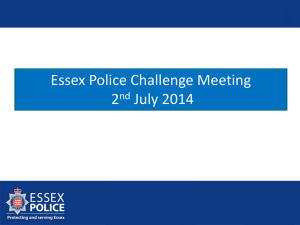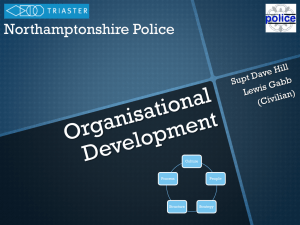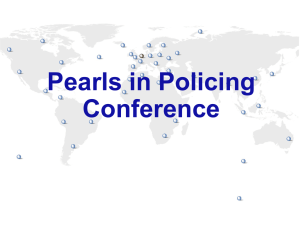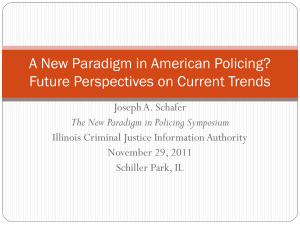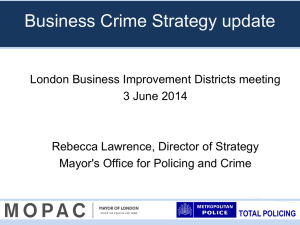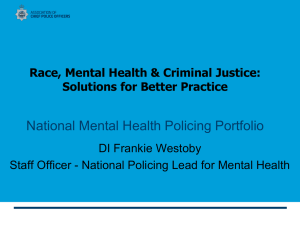his presentation here
advertisement
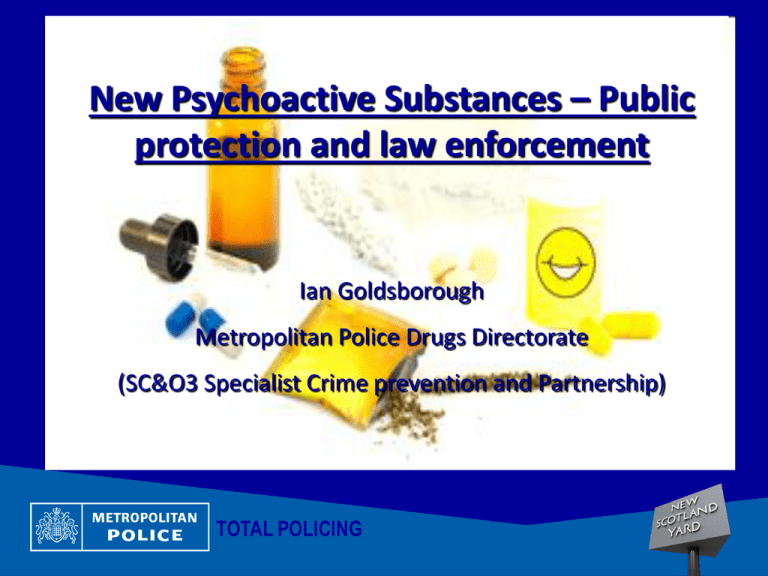
New Psychoactive Substances – Public protection and law enforcement Ian Goldsborough Metropolitan Police Drugs Directorate (SC&O3 Specialist Crime prevention and Partnership) TOTAL POLICING What are we going to discuss? • How are new Psychoactive Substances (NPS) defined within the law? • What statutes deal with NPS? • What are the issues affecting law enforcement in this area? • What does law enforcement know about NPS? • The future – from a police point of view. TOTAL POLICING What are New Psychoactive Substances? Legal Highs? •Not always legal! •No guarantee of high. •"Just because a substance is termed 'legal' this does not make it safe, nor may it be legal" New ? Some substances were synthesised years ago CONFUSED ? TOTAL POLICING Definition – European Council • “ a new narcotic drug substance in pure form or in a preparation (not scheduled under the 1961 United Nations Single Convention on Narcotic Drugs, and that may pose a threat to public health comparable to the substances listed) or a new psychotropic drug in pure form or in a preparation (not been scheduled under the 1971 United Nations Convention on Psychotropic Substances, and that may pose a threat to public health comparable to the substances listed)". TOTAL POLICING Definition- Advisory Council on Misuse of drugs (ACMD) • “psychoactive drugs which are not prohibited by the United Nations Single Convention on Narcotic Drugs or by the Misuse of Drugs Act 1971, and which people in the UK are seeking for intoxicant use…. “generally legally available, they fall into 4 categories : (1) Products with names which give no indication of what they contain; (2) Named and specific substances which are designed to be similar chemically and/or pharmacologically to known specific controlled drugs; (3) Substances related to medicines; and (4) Herbal or fungal materials or their extracts. TOTAL POLICING Definition- Association of Chief Police Officers (ACPO) • “…. NPS or so called ‘legal highs’ are substances which produce the same, or similar effects, to illegal stimulant drugs such as cocaine and ecstasy, but are not controlled under legislation [the Misuse of Drugs Act 1971 in the UK]. They are however, considered illegal under current medicines legislation to sell, supply or advertise for “human consumption”. To get round this sellers refer to them as research chemicals, plant food, bath crystals or pond cleaner. A number of NPS have been controlled under the Misuse of Drugs Act 1971, including mephedrone, BZP and naphyrone”. TOTAL POLICING Definition – Project Portmanteau • “ a narcotic or psychotropic substance newly available in the UK [and mostly but not exclusively synthetic] which may pose a public health threat comparable to drugs controlled under the Misuse of Drugs Act 1971” TOTAL POLICING The main legislative acts in relation to controlled drugs are: •Misuse of Drugs Act 1971 •Drugs Act 2005 •Medicines Act 1968 ( and regulations) TOTAL POLICING •Misuse of Drugs Act 1971 • Created offences in relation to manufacture, trafficking, supply and possession offences • Class of drugs in schedule which provides maximum sentences • Most harmful considered in Class A • Additional substances can be added (2009 - 2010 NPS additions) TOTAL POLICING •Drugs Act 2005 • Provides additional sentencing for aggravated sale of drugs (educational premises). • Allowed for testing of suspects and creation of certain drug intervention orders. • Added certain mushrooms (hallucinogenic to list of controlled drugs) TOTAL POLICING •Medicines Act 1968 ( and regulations) • Governs the manufacture and supply of medicines, whether they be general sale, or prescription only TOTAL POLICING Blocks to LEA enforcement MDA 1971. •Not controlled substances •Chemically adjusted substances take place of controlled drugs. •Statutory defence used. •Suppliers provide documentation assisting in this. •LEA competing demands TOTAL POLICING Medicines Act •Inclusion of 'Not for human consumption and thinly veiled explanations circumvent act. •Controlled drugs not included MDA then needed. Were there any alternatives? Trading Standards & Consumer Protection legislation TOTAL POLICING Annual drug strategy review – action plan: “Encourage enforcement activity by Trading Standards whenever offences under the Consumer Protection from Unfair Trading Regulations 2008 and the General Product Safety Regulations 2005 are suspected; and work with Trading Standards to develop guidance on the circumstances in which consumer protection legislation could be used effectively”. ACMD: “…the ACMD believes that there is a role here for the Trading Standards Institute to play, in relation to policing head shops that sell NPS (“legal highs”) with misleading statements”. “Recommendation: The powers available in the Consumer Protection from Unfair Trading Regulations (2008) (CPRs) and General Product Safety Regulations (2005) (GPSRs) should be fully utilised to control the trade in NPS” TOTAL POLICING Trading Standards Legislation TSS’ enforce a broad range of legislation which, as well as fair trading, often includes responsibility for animal health, underage sales of products such as tobacco, solvents and fireworks (and in England & Wales, food safety and underage sales of alcohol). •The Consumer Protection from Unfair Trading Regulations 2008 (CPR’s) - Product Descriptions the General Product (Safety) Regulations 2005 (GPSR) TOTAL POLICING CPRs GPSR •causes or is likely to cause the average consumer to take a transactional decision he would not have taken otherwise – not likely to work – •Does provide certain investigative powers. • £15 – £30 per gram 'bath salt' •Consequently 'transactional decision not altered by mis description. • Could use safety regulations – TOTAL POLICING •Huge cost – forensic analysis/ experts, etc. •Precautionary principle •Limited budget •Geographical responsibilities. •Limited sanctions. Human 'lab rats' risk death with legal highs Undercover police snare drug dealers a"legal high" shop; Eight in the dock after raid on seaside town's store. A hundred police raid Southend nightclub TOTAL POLICING Police •Harm reduction/ ASB investigations •Local partner led reactive operations •Local proactive operations •Test purchase •Anti-social behaviour •Activity in relation to temporary class drugs. •change = no offence of possession TOTAL POLICING New steps •Forensic early warning – FEWS •http://www.homeoffice.gov.uk/publications/alcohol-drugs/drugs/drugstrategy/fews?view=Binary •Police collection plan – all forensic providers for •Prevalence / purity •Trends •Attendance at music festivals, supporting policing operational activity. • Also Test purchase from sale points TOTAL POLICING United Kingdom Border Agency (UKBA) •Most substances come from abroad. •Seizure for mis-description. Serious & Organised Crime Agency (SOCA) •International work with partners •Disruption of organised criminal activity •Activity relating to sale of now controlled drugs TOTAL POLICING Future Steps All party Parliamentary Group for Drug Policy reform •Temporary Control orders –'drug supply control orders' •Independence and clarification of role of ACMD •National review of drug legislation •Enhancing role of TS •Onus on supplier to show low risk of substance – new D classification. •Preventative programmes to be promoted, resourced and assessed. TOTAL POLICING Conclusion NPS as an issue requires: Education. Harm reduction. Prevention. Research as to the harms caused. Law enforcement alone will achieve little. TOTAL POLICING Questions ? ian.goldsborough@met.pnn.police.uk TOTAL POLICING 23
